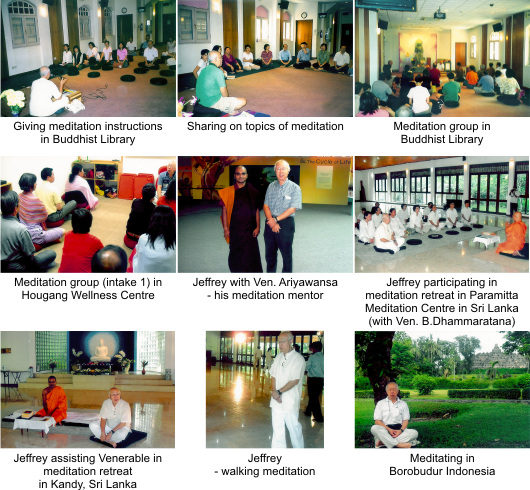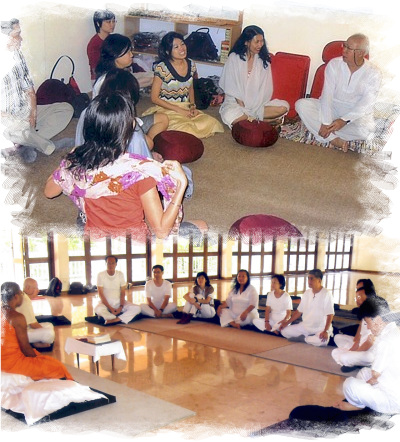Regional Signature Courses and Workshops
Regional Human Skills designs, organizes and deliver several signature workshops and courses. They have been arranged and specially designed to meet the needs of specific interest groups. They are affordable and are presented in a simple but yet effective manner by Jeffrey and/or his collegues. Wherever and whenever necessary, suitable videos are shown to reinforce the theoretical knowledge. Some of the workshops and courses offered includes:
- Para-Counselling:
This is a two day intensive course that has been designed especially for those needing some skills when engaged in befriending, mentoring or some simple counselling services. The course content includes topics such as counselling skills and techniques and some popularly used therapy methodologies. The course is usually held over the weekends - Saturday and Sunday and a certificate of participation is awarded to those who successfully complete the training programme. This course was designed in consultation with several senior citizen homes who found that some of their befrienders needed such micro skills. It is not meant to be an academic course.
- Fundamental of Buddhist Studies:
The Fundamental of Buddhist Studies runs for 10 lessons for 2 hours per lesson and is usually held over the weekeneds. The course followed a modified syllabus of the Structured Fundamental of Buddhist Studies Course that had been designed for those incarcerated by Jeffrey. Here participants are focused towards "Early Indian Buddhism". Such focus can provide them useful platform for further progression into studies of other Buddhist traditions. Some topics include "Life of Gotama the Buddha", "Some Important Discourses and Teachings", the "Expansion of Buddhism into Asia and South East Asia", the "Various Buddhist Sects" and finally the "Significance of Buddhism Within The Modern Context".
- Introduction to Buddhist Psychology:
This topic is based upon a similar topic to that designed by Jeffrey and conducted annually in the Singapore Buddhist Library. It is somewhat modified to include western psychological concepts. To reinforce and make the course interesting, relevant videos are screened. Fundamentally, this 10 session course (2 hours per session) is based upon Buddhist Abhidhamma principles. Students are introduced to some of its principle concepts. Topics like consciousness, mental factors, matter and Nibbana are discussed. Students are then made to realise the synthesis of those ancient wisdom with modern philosophical and psychological concepts.
- Meditative Psychotherapy:
Many would associate meditation to that of a religious or spiritual path. However, owing to the many researches done recently by reputable Universities and research organisations, meditation techniques have been found to be therapeutic processes also. This full day workshop attempts to show participants that skillfully employed, meditative psychotherapy can be usefully employed by those engaged in the mental health industry or providing caring services. In the course, participants will be provided with some theoretical knowledge and hands-on skills also.
- Clinical Counselling Supervision Course:
Two such courses are available through Regional Human Skills. They have been designed with the arrangements of two Australian organisations. The two courses are:
- Certificate in Proficiency in Counselling Supervision and
- Graduate Diploma in Counselling Supervision (Australian National Accreditation)
Both courses are conducted in Singapore and by Australian expert in the field.
Successful completition of those courses can serve as the minimum entry requirements to the supervisory gradel (level) of the Association of Counsellors and Psychotherapists (Singapore), the Australian Counselling Association and the Malaysian Psychotherapy Association.
Please enquire for more details.
- Meditation:
Meditation is more than merely sitting down crossed legged for a few hours. At one end it is a practice whereby the meditator enjoys a few moments of mental relaxations and to be in mental states that is free of anxieties and pressure. At the other extreme, meditation is a spiritual quest whereby the yogi attempts to fulfill his innermost desire to fathom the meaning of life and death - to finally utilize such realization for his own betterment in facing the multifarious vicissitudes of life and preparation to face moments of death.
Meditation has been associated with the religion, historicity and culture of both Hinduism and Buddhism. This is rightly so because the practice of meditation actually predates both such systems and was particularly imbued into the social system of the Indian subcontinent. Archeological discoveries have revealed that ascetics living as far back as during the ancient Harrapa and Mohendojero civilizations of the Indus valley (some 5000 BCE) practiced such mental exercises and culture.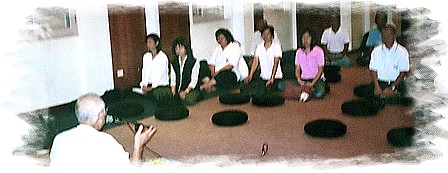
Why meditate?
Today, it is an established fact that meditational exercises and practices do bring about certain mental relief for the yogi. For those who finds the strains of having to face daily life's challenges - work, family, financial, social, spiritual - meditation allows the yogi certain mental transformations to perceive the external world from differing viewpoints. With that the yogi eventually adopts the new found mental culture as part of his life. He stabilizes himself in the turbulent sea of uncertainties.
Is meditation harmful?
A resounding NO! No one has yet died because of meditation or through meditation practices. Under the careful tutelage of a skill meditation trainer, practitioners can hope to benefit greatly through the freeing of the mind from "unnecessary and unwanted baggage" that had burdened him throughout his life. In fact meditation sets about a sense of mental peacefulness and tranquility mood.
When can one start?
Anytime and the sooner the better. Just as you wish for healthy physical life - free from or at least the lessening of diseases and sicknesses that afflict our bodies - by paying careful considerations with your diet; just as you would desire for graceful ageing by participating in some sort of physical exercises and so for improved mental health you can start meditating as soon as possible.Must one be a Buddhist to practice meditation?
Definately no! As mentioned above the art of meditation pre-dates Buddhistic period. Buddhism is involved in the sense that it systemised and perfected this ancient system of mental health ,cultivation and culture. The art of meditation is thereaupetic and it was said that early Christains and non-Buddhists did practice some form of meditation - contemplation, reflection, introspection, concentration, focussing of mind and even praying. They had found it to be a useful technique to achieve union with God and experience spiritual and religious esctacies. Depending upon the motives and inclinations of the practitioner, meditation can therefore offer the yogi a sense of mental and physical wellness, a spiritual path or a religion quest.
Some helpful topics covered during meditation sessions- Discovering yourself
- Journey thought life
- Living in the present moment
- Re-inventing yourself
- Overcoming negative feelings
- Building positive emotions
- Managing stresses and anxieties
- Conquering fear
- Establishing peace, tranquility and love
- The search for happiness
Meditation techinques/style used by Jeffrey
- Psychosynthetic-Buddhism (an intergration of Psychosynthesis and Buddhist meditation system)
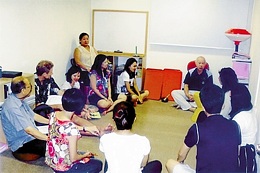
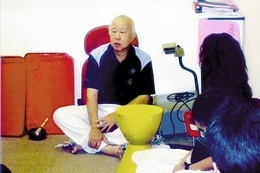
Jeffrey instructing yogis in Hougang Centre - 2011 Close up view of Jeffrey - 2011 